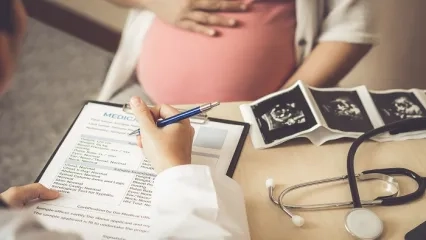Alo Yeditepe
Alo Yeditepe
What is Risky Pregnancy?
What Does It Mean If Pregnancy Is Risky?
Risky pregnancy includes the risks experienced by the mother, the fetus, or both due to some problems that occur before pregnancy or during pregnancy or birth. Perinatology specialists detect and monitor perinatal mortality and morbidity according to certain criteria. The lowness of these figures is in direct proportion to the development level of the country.
Is It Possible to Detect Risks in Pregnancy at the Early Stage?
It is possible to detect risks that may occur during pregnancy. For this reason, perinatology, a sub-branch of obstetrics and gynecology, was created for this purpose all over the world. The aim is to detect problems at an early stage and eliminate them with minimal or no damage before they cause bigger problems. At this point, the pregnant woman's story is important first. Especially those who have some risks in terms of risky pregnancy. Whether or not the couple is consanguineous, has diabetes, has diabetes or heart disease without realizing it, has hypertension or thyroid... If all these problems are determined in advance, a significant part of the risks will be determined before pregnancy.
In addition, some problems that may arise during pregnancy, even though there is no previous problem, can put the pregnancy in a risky situation. For example, high blood pressure or heart problems that occur during pregnancy, such as palpitations. Apart from that, examinations regarding the fetus continue. It is investigated whether the child is healthy, whether there is a chromosomal problem or a problem in its development.
Does bleeding during pregnancy pose a risk?
Bleeding not only affects the mother in terms of the risk of anemia it may create, but in certain cases it is possible for the child to become without blood and even develop a life-threatening risk. For this reason, bleeding always puts the mother and the fetus in the high-risk pregnancy group.
Does Premature Birth Also Cause a Risk?
The main subject of perinatology is to resist possible risks to the mother and child. One of these is premature birth, which is an important problem both in the world and in our country. Approximately 6-8 percent of all pregnancies result in premature birth. Approximately one million two hundred thousand births occur every year in our country, and approximately 20 thousand of these are premature births.
Premature birth is the completion of pregnancy, which normally lasts 40 weeks, in much earlier weeks. Sometimes this may be in the 30th week, and sometimes it can be in the 25th week. The duty of perinatologists is to delay premature birth as much as possible with appropriate treatments. During this process, They work in close contact with the obstetrics, genetics and neonatal team.
Which Medicines Can Be Used During Pregnancy / Which Medicines Should Not Be Used During Pregnancy?
There are medication and treatment groups that can be used during pregnancy. Because some drug groups can cause disability in the baby during pregnancy. Especially the first three months of pregnancy are very important in terms of drug use. There are medications that should not be used due to the risk of injury they may cause in the following period. Therefore, following the guidelines published by the FDA, drugs are divided into groups such as less harmful, harmless and not harmful to pregnancy. Accordingly, treatment is planned according to the condition of the pregnant woman. At this point, a perinatologist and, if any, a gynecologist monitoring the pregnancy should be consulted.
How to Act in Case of Pregnancy Poisoning (Preeclampsia)?
Pre-eclampsia, defined as pregnancy poisoning, is a condition characterized by high blood pressure, edema, albuminuria and proteinuria. This condition occurs 25 percent during pregnancy and before birth, 50 percent at birth and 25 percent after birth. For this reason, it is necessary to know that problems that may arise in the 42 days after birth, that is, during the puerperal period, may be related to pregnancy. While perinatology specialists deal with any problems that may arise during this period, they are referred to the relevant branches at the end of this process.
This content was prepared by Yeditepe University Hospitals Medical Editorial Board.
Alo Yeditepe




